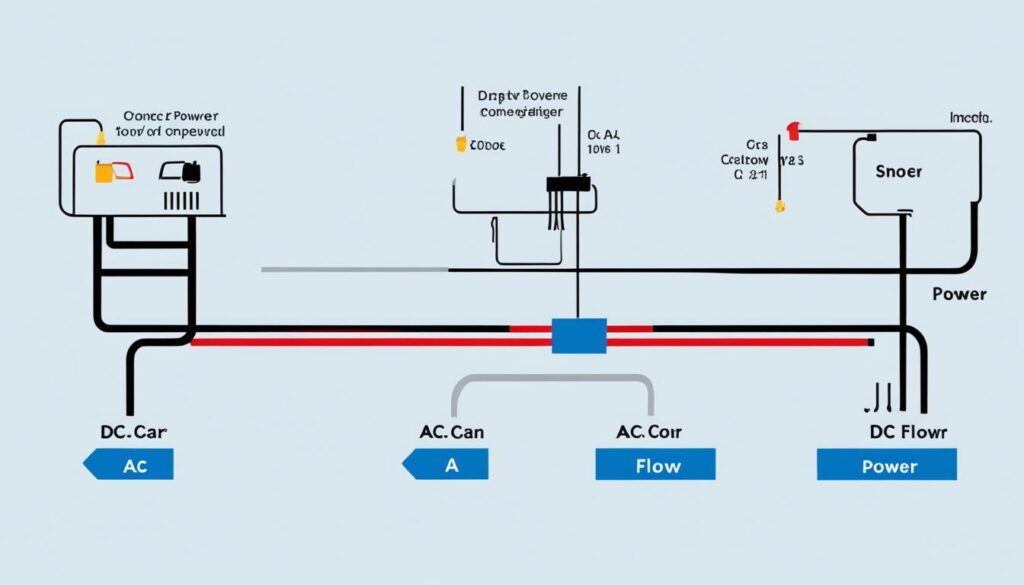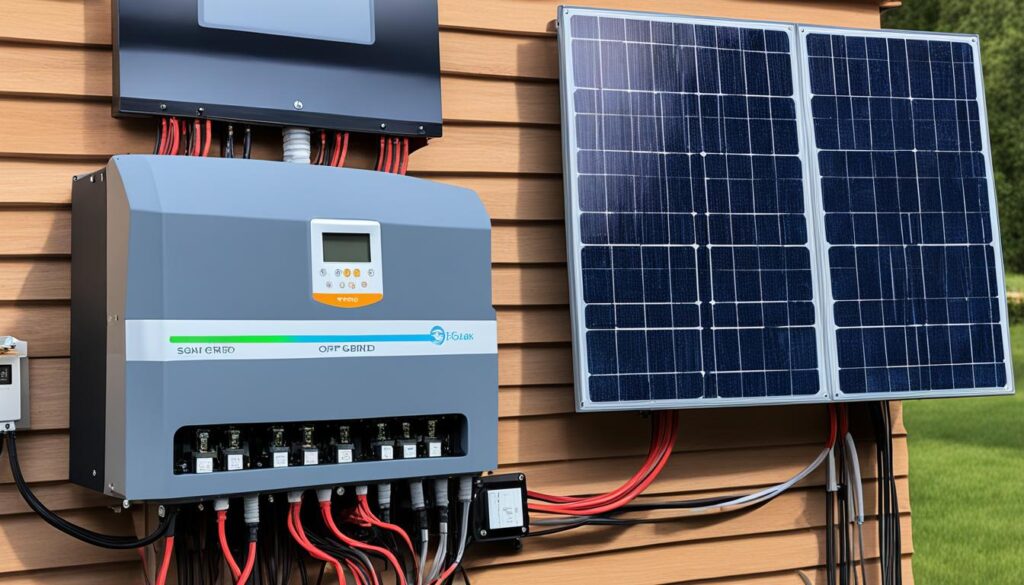In the world of renewable energy, the off-grid solar inverter is key to powering our lives. This guide will explore solar inverters. It will explain the difference between DC and AC power. It will also look at the types of inverters available. This is crucial for your off-grid power needs. Whether you want to use the sun for your solar power system, or need a battery backup for your grid-tied systems, this article will help. It will give you the info you need to choose the right off-grid solar inverter for you.
Key Takeaways
- Understand the fundamental differences between DC and AC power, and the importance of an inverter in an off-grid solar system.
- Explore the various types of DC-to-AC power inverters, including pure sine wave, modified sine wave, and square wave inverters.
- Discover the key factors to consider when selecting the right off-grid solar inverter, such as power output, waveform, efficiency, and manufacturer reputation.
- Learn how to make an informed decision and find the perfect off-grid solar inverter to power your home or remote application.
- Gain insights into the advantages and limitations of each inverter type, ensuring you choose the best solution for your specific energy needs.
Understanding DC and AC Power
Electricity has two main types: direct current (DC) and alternating current (AC). Knowing the key differences is important for picking the best off-grid solar inverter. This choice is crucial for your energy usage.
What is DC Power?
DC power comes from solar panels and is saved in batteries. It moves in one direction with the same positive and negative. Using DC power is very efficient for collecting and storing solar energy.
Advantages and Disadvantages of DC Power
DC power does well in turning solar energy into electricity. It’s great for storing energy in batteries. But, most appliances at home work on AC power. You need an inverter to change DC into AC for them.
What is AC Power?
AC power is what we use at home and on the power grid. It moves back and forth, switching positive and negative. This is the type of power our household items and gadgets run on.
Advantages and Disadvantages of AC Power
AC power can travel long distances with little energy loss. It’s also easy to change AC power to different voltages. But, it’s not good for saving energy like DC power is. That’s why we need inverters for battery-powered systems.
| Characteristic | DC Power | AC Power |
|---|---|---|
| Flow Direction | Single Direction | Back and Forth |
| Polarity | Consistent | Changing |
| Primary Source | Solar Panels, Batteries | Power Grid |
| Efficiency for Energy Storage | High | Low |
| Efficiency for Power Transmission | Low | High |
| Compatibility with Household Appliances | Requires Conversion | Direct Compatibility |

Off Grid Solar Inverter
In an off-grid solar power system, the inverter is key. It changes the DC power solar panels make into AC power. This lets you use it for your home’s devices because most need AC power to work.
Why Do You Need an Inverter?
The main job of an inverter in a solar system is changing DC to AC power. Most home devices run on AC power, not DC. So, the inverter is essential for making sure your solar power can actually be used.
How Does a DC-to-AC Power Inverter Work?
These inverters take DC power from solar panels and turn it into AC. They do this using special circuits. They also adjust the voltage so your electronics can use it safely.
Types of DC-to-AC Power Inverters
Three types of inverters stand out: pure sine wave, modified sine wave, and square wave. They each make a different kind of power.
Pure Sine Wave Inverters are top of the line. They make power like the one from the grid. They work best with fancy electronics and appliances.
Modified Sine Wave Inverters are a budget-friendly choice. But, they make power that’s not as clean as what pure sine wave inverters do. This can give trouble to some appliances and electronics.
Square Wave Inverters are basic and cheap. They make power in a simple form, which isn’t as good as the others. Use these for simple jobs, like lighting or heating up things only.
Choosing the Right Off Grid Solar Inverter
Selecting the right off-grid solar inverter is key to a reliable renewable energy system. Different types of inverters meet various power quality needs and uses. We will look at the main types: pure sine wave, modified sine wave, and square wave.
Pure Sine Wave Inverters
Pure sine wave inverters are best for off-grid solar setups. They offer top-quality AC power. Their waveform matches utility electricity, making them compatible with sensitive electronics. They have low total harmonic distortion (THD) for excellent power quality. This is why they’re ideal for devices like computers, TVs, and medical equipment.
Modified Sine Wave Inverters
Modified sine wave inverters are more budget-friendly but offer lower-quality power. Their waveform isn’t as smooth, which can affect some equipment. They aren’t the best choice for high-end electronics or devices. Yet, they are good enough for basic power needs in off-grid setups where saving money is a key factor.
Square Wave Inverters
Square wave inverters are the simplest and cheapest form of inverter. They create a square waveform, providing the lowest power quality. They’re okay for very basic tasks like powering lights or heaters. However, they might harm or fail to work with modern electronics. While they are the most economical option, they suit a limited range of uses in off-grid solar systems.
Conclusion
Choosing the right off-grid solar inverter is key to a top-notch off-grid power system. By knowing the differences between DC and AC power, an inverter’s key role, and the available types, you’ll pick what fits your energy needs. This choice means your off-grid solar setup will perform at its best.
This article offers guidance through the selection process to find the perfect off-grid solar inverter. You might need a pure sine wave, modified sine wave, or square wave inverter. What you choose depends on power conversion, energy efficiency, and your system design. Using our buying guide, you can confidently pick the right inverter for your needs.
With a well-informed choice, your off-grid solar power system will be reliable, perform well, and last long. This means a sustainable and independent energy source for your home or off-grid venture.
FAQ
What is DC power and how is it used in off-grid solar systems?
DC (direct current) power comes from solar panels. It’s stored in batteries. This power runs in one direction with the same polarity. It’s perfect for making solar energy and saving it in batteries.
What are the advantages and disadvantages of AC power?
AC (alternating current) power’s big plus is it can travel far with little loss. It’s easy to change to various voltage levels for use. Yet, AC isn’t great for storing energy. That’s why off-grid systems use an inverter to turn stored DC into AC.
Why is an inverter necessary in an off-grid solar system?
In off-grid solar setups, an inverter is crucial. It turns the solar panels’ DC power into AC. This AC powers our home electronics and appliances. Without it, we can’t use most household items.
What are the different types of DC-to-AC power inverters?
DC-to-AC power inverters can be pure sine wave, modified sine wave, or square wave types. Pure sine wave is the best because it gives the highest-quality power. Modified sine wave is cheaper but can cause issues for some gadgets. Square wave inverters are basic and affordable but give the lowest-quality power.
What are the key factors to consider when choosing an off-grid solar inverter?
Picking an off-grid solar inverter means thinking about power, waveform, efficiency, and the maker’s reputation. For most solar uses, go for a pure sine wave inverter. It offers the best AC quality.

